Please note: this magazine was too large for the scanner so I’ve scanned pages in sections & joined them back together on the text pages but I’ve just scanned the centre of the photo pages.
Transcript; many thanks to Iva over at Invisible-Movement.net
Shine On
With the release of their seventh album, the Red Hot Chili Peppers are beginning to see the light.
The setting of the Red Hot Chili Peppers’ sold-out show at Pontiac, Michigan’s Clutch Cargo couldn’t be much more symbolic. The mostly high school-aged audience of 1400 plus – very intimate for a Chili Peppers gig – is bouncing, pogoing and crowd-surfing in the middle of a former church-turned-rock-venue, as the band blasts out songs under a 65-foot cathedral ceiling. The club’s once ecclesiastical stained-glass windows are now faux and cheap, but the band is at the altar; the stage is their pulpit; the reverent fans are in the throes of ecstasy. Welcome to the resurrection.
You could call it a comeback, but it’s not like the quintessential Los Angeles veterans really went away or anything – mega-hits like “Under The Bridge” and “Give It Away”, from their multiplatinum 1991 release, Blood Sugar Sex Magik, have been steady radio fare throughout the decade. It’s been nearly four years since the Peppers put
out 1995’s One Hot Minute, but the band still gives up the funk, driving the room ballistic with a set featuring songs from their recently released seventh effort, Californication, and including old favorites like the celebratory “Me & My Friends”.
This is, however; the second coming of John Frusciante, the one-time boy genius who, at age 18, joined the band for the rise to fame and fortune that followed original guitarist’s Hillel Slovak’s heroin-overdose death in June 1988. Frusciante’s return is like adding the last piece to a jigsaw puzzle – he fits, and makes the group complete. When frontman Anthony Kiedis bounds onstage to join Frusciante, Michael “Flea” Balzary and Chad Smith for Californication’s “Around The World”, the band’s communication level seems as telepathic as it is typically kinetic.
For an hour; the Chili Peppers preach to the clearly converted. But more than the message, it’s how they deliver the sermon that makes the impression. Mixed in with the quartet’s kaleidoscopic blend of punk, funk and hard-hitting rock’n’roll is an unmistakable sense of command and an accompanying, if underlying, maturity. Having left behind the socks-on-cocks hijinks that made their early performances infamous, they now possess an almost stately grace.
Initially taken by many as a crude joke, the Red Hot Chili Peppers have become one of the modern era’s most influential outfits, nothing less than a bridge from the twilight of the P-Funk empire to the grave new world of metal/hip-hop alchemists like Korn and Limp Bizkit. After a 16-year career/odyssey marked by emotional turmoil, battles with drug addiction, and worldwide domination, the Red Hot Chili Peppers are right where they want to be.
Well, for now, a nondescript conference room in a downtown Detroit hotel is probably the last place the band wants to be. But Frusciante has already dealt with the situation by waking early, getting coffee and hitting the nearest record store. He is joined by Kiedis, who upon hearing details of Frusciante’s morning supportively tells his bandmate, “It’s
good you have something that makes you happy in a situation where you need to be happy,” then announces, “John’s idea of a night on the town is to go and hit the record store.” Frusciante sheepishly grins.
Before he entered a drug rehabilitation program in the fall of 1997, however, Frusciante’s nights were significantly less wholesome. After joining the band for 1989’s Mother’s Milk and Blood Sugar Sex Magik, Frusciante succumbed to tour-related stress in May 1992 and abruptly quit the group while in Japan. Returning to Los Angeles, he slid quickly into heroin-addiction. Niandra Ladies [sic] and Usually Just A T-Shirt, a CD of home recordings released in 1994, is a collection of eccentric performances – sometimes gripping and soulful, sometimes painful – that documents the guitarist’s descent with unsettling verité. A second solo outing, Smile From The Streets You Hold, was released in 1007.
But from his first moments of stage, and repeated listens to his performances on Californication, it’s obvious Frusciante is healthy again. His guitar playing is fluid and lyrical, a confident blend of finesse, soul and power. Throughout the band’s set, he and Flea intermittently lock into brief extended jams that show both an emotional and musical closeness. As close as he was to steadily killing himself with drugs – and a harrowing 1996 in Los Angeles’ New Times pulled no punches in depicting the guitarist’s then- deteriorating condition – Frusciante is now creative and vibrant.
“I had no image to care about or to present to anyone then,” Frusciante says. “I wasn’t ashamed. And I think that’s why I can do what I’m doing now, ’cause I was as close to dying as a person could be.”
During Frusciante’s absence, the Chili Peppers relied on hired hands to get them through and past Lollapalooza ’92 before recruiting Jane’s Addiction guitarist Dave Navarro to the group for One Hot Minute.
In a separate interview which he attended attired in an oversized Mexican poncho (and nothing else), Flea admits he feared for Frusciante. “I was terrified. It was just sad,” Flea says softly. “I thought for sure he was gonna die.”
Abruptly, the bassist breaks into a grin and adds, “But he didn’t, and he’s doing great now. He’s totally clean. And he’s not self-righteous – he’s just happy where he’s at. It’s like, ‘Well, I did that, and I don’t need to do drugs anymore. I know what that’s all about.'”
Months after Frusciante completed rehab, Flea asked him to rejoin the group following Navarro’s April 1998 departure.
In late 1997, the band had retreated to Hawaii (as they had prior to One Hot Minute), writing songs with Navarro for their next album. Yet the lineup was beginning to unravel.
“The fact is that we all knew it wasn’t working out,” Flea explains. “But I wouldn’t want anyone to think it was Dave’s fault. I love Dave, and he’s an amazing guitar player and a great guy.” Flea’s stint as bass player for Jane’s Addiction’s 1997 Relapse tour not only speak to his relationship with Navarro, but to the long-standing friendship between the two seminal L.A. groups.
“When things ended up not working out with Dave,” Flea says, “we just scrapped all that stuff and started fresh with John.”
Among Frusciante’s current habits: a daily yoga regimen, record shopping (he’s currently stocking up on Who discs and missing pieces in his beloved Zappa collection) and, in Flea’s words, “playing guitar like a maniac.”
After fighting his own battles with heroin over the years, Kiedis is also clean again, and Californication reflects sunny, if bittersweet, nuances. Many of the album’s 15 tracks could be characterized as buoyant.
“Buoyant is good,” beams Kiedis, arching his thick eyebrows in pleasure. “I like to be buoyant. You hear that, John – he called us buoyant. I’m feeling very light in this room right now.”
Positivity seems to be a Zen-like glue now holding the Chili Peppers together. Despite their multiplatinum career, given the difficulties the quartet’s members have recently endured – Frusciante’s decline, divorces for Smith and Flea, 1997 motorcycle accidents for Smith and Kiedis – can you blame them for seeking a little salvation? This one thing the group seems to somehow avoid is the kind of well-publicized drug arrests that have surrounded artists like Ol’ Dirty Bastard or Stone Temple Pilot Scott Weiland.
“We’re too slick to get busted,” Flea laughs. By most accounts, Flea hasn’t plumbed the same depths as Kiedis and Frusciante, but – especially as he watches his ten-year-old daughter mature – he’d still like to be remembered more for the good stuff.
“Drugs have been a part of our lives and have affected us as human beings no doubt, but it’s a little part of our lives,” he explains. “I mean, this whole band has been about creating good feelings and creating good music and going out and busting our asses on stage and doing all this stuff to really entertain people and create light and fun and good
stuff.
“We grew up in the culture that we grew up in and we ended up being what we are. But it’s like, what about the beauty? I don’t mind talking about embracing the dark side of my life or anything like that because it’s real. But there’s equal parts of dark and light. And there’s equal parts of joy and sadness.”
Flea attributes the group’s resounding positivity to perseverance and understanding. “It’s just getting John back and going through everything that we went through,” he offers. “I think we just realized to respect each other and to love each other. The band is in a really
positive place.”
You can hear it on Californication, where the group bittersweetly reaffirms its Angeleno roots on the title track and “Parallel Universe” (where Kiedis cries, “I’m a California King”). As much a chart of the group’s evolution as it is a return to form following One Hot Minute (which some characterized as the Peppers’ “heavy metal” album), Californication’s expansive range is its ace in the hole. The disco intro to “Parallel Universe” gives way to a scorching Western giddy-up motif in the chorus, and Frusciante’s Hendrix-like excursions at the song’s close. “This Velvet Glove” strikes an intricate balance between a lush acoustic guitar foundation and anthemic rock. Gentle ballads (“Scar Tissue”, “Porcelain”) and confessionals (“Savior”, the gorgeous, Chamberlin organ-colored “Road Trippin'”) stacks up with nods to funk roots (“Get On Top”, “I Like Dirt”, “Around The World”) and forward-thinking rockers like “Emit Remmus”.
Even in their raunchiest moments, the Peppers remain optimistic. Within the chorus of “Purple Stain” – a song otherwise based on sex during the menstrual cycle – Kiedis raps: “Knock on wood we all stay good/’Cause we all live in Hollywood.”
“LA is weird, in the sense that it’s so culturally rich and so culturally vapid at the same time,” Flea figures. “Y’know what I mean – it’s crazy like that. There’s a lot of good parts of it and there’s a lot of really shitty parts of it, and I think that we kind of absorb all of
those, consciously or not.
“The hardest thing for me about LA is it’s just kind of hostile. When I was a kid, I walked two miles to school. These days I wouldn’t let my daughter walk to school if my fucking life depended on it.”
Kiedis confesses, “I absolutely love Los Angeles and it makes me sick to my stomach, because it is a place that is so full of opposites and energies and creativity and decadence and disgusting vanity and selfishness and tiny little bubbles of plastic reality. But at the same time, it’s got some of the most beautiful everything I’ve ever seen. From the hills and the ocean at Malibu to the deserts just to the eats of the city to the snow-capped mountains you can see when you’re lying by your pool in the Hollywood Hills – there’s just a massive amount of energy there.”
Listening quietly to his friend, Frusciante responds, “Y’know, I’ve had the sense, being in a place like New York, of being sort of squeezed out of it, and I feel like there’s always a space for me in Los Angeles.”
Reassuringly, Kiedis replies, “And there is.”
“It’s just a sense that I have of where, I suppose, the spirits want me to be,” Frusciante adds.
“I feel the same way,” says Kiedis. “There are very welcoming spirits, especially in Hollywood sometimes.”
“I’ll go to this little corner just north of Hollywood Boulevard,” he continues. “To me, it’s known as the most sunny spot in all of Hollywood. Even on a cloudy, rainy day, if there’s gonna be a little sunspot somewhere, that’s like the first corner that it hits. It’s where
Joseph’s Cafe is. And every time I’m there, it’s like, ‘Well, they’re happy to have me right here. I may as well have some lentil soup.'”
Despite his warm vibes, Kiedis can be intimidating when provoked. And he’s not afraid to call anybody on their shit.
So I discover by asking about the pre-album release mini-tour that’s brought the band here to Detroit. Organized to promote teen tolerance and played exclusively for high school students who contacted sponsoring radio stations with ideas on ending violence. I wonder aloud if the five-city series was an attempt to put a “nice, happy face on rock ‘n’ roll” in the wake of the tragedy at Littleton, Colorado’s Columbine High.
“That’s a pretty cynical thought process,” Kiedis snaps, shooting me a glare.
Well, a little cynicism goes a long way. But these days – with Frusciante joyously back in the band, drug problems in check and Californication climbing the charts and garnering critical acclaim – the Chili Peppers have no room for cynicism in their worldview.
It turns out the “X Out The Hate” shows have originated weeks before the Columbine shooting as a fun promotional concept where high school students could win a rare club performance by the band. It’s not a novel idea (several upstart rock artists had earlier performed at US high schools in an effort to win new fans) but it’s special when it’s the Chili Peppers.
The band, Warner Bros., and Seattle modern-rock station KNDD initiated the May mini-tour, held in all-ages venues in Seattle, Portland, Minneapolis, Philadelphia and here at Clutch Cargo.
Kiedis elaborates, “It was like, ‘Okay, what can we do before our record comes out to go and show how in love with this we are?’ Just to promote our record and say that we made one of the best records we’ve ever made and play to some kids at the same time, which is a fun age group to play for. And then people got mowed down at Columbine.
“All the radio stations that had been tied into this were like, ‘Would you play under the banner of tolerance?'” says Kiedis. “And we’re like, ‘Yeah, we wanna play, and our music
is tolerance.'”
That ticket giveaways for the shows were based on student-participation in conceptualizing an end to violence – via letters, calls and e-mails to sponsoring radio stations – was a bonus. “[Kids] may as well be thinking along those lines,” Kiedis argues. “Have them sit down and write about their situation if they want to figure out how to make it better. And that’s what they did, and it turned out to be a great thing.
“And the energy in the room when we walk in there is bitchin’,” he beams, finally. “And it’s all free.”
That energy is palpable when Kiedis – sporting dyed blond hair and an apropos schoolboy uniform – hits the stage.
As strange as it seems, the band being so identified with Los Angeles, this is also a kind of homecoming for two of the Peppers. Kiedis’ mother is up in the balcony. She lives in Grand Rapids – where Anthony was born at St. Mary’s hospital – and drove in for tonight’s performance. Smith was born and raised in Bloomfield Hills, just miles from the club. His parents are also in attendance.
Smith knows this venue well, in fact: Several years ago, when Clutch Cargo ran under the name Sanctrum, he entered the Guiness Book of World Records here by playing the world’s largest drum kit (308 pieces – eat your heart out, Neil Peart.)
Smith also got personally involved in the promotion for this event by taking time between the Seattle and Minneapolis dates to appear on Detroit’s 89X. What was supposed to be a brief interview on the FM radio station turned into a lengthy two-and-a-half hour session.
“These kids would call in to win tickets and talk about what they felt their school needed or how to help things,” Smith says. “All of them sounded really desperate and scared and confused.” The drummer let his roots as a Detroit tough show thorough as he took calls from the listening audience and tried to provide some understanding. “I didn’t really attend school,” Smith laughs, “I just attended the parking lot, smoked pot and listened to Rush 8-tracks in my friend’s car.”
Father to a pair of daughters (aged two and three), Smith says, “I think it’s sometimes difficult for kids to relate to their teachers, or even other students and their families. I don’t pretend to have any answers, though – I mean, it’s been a long time and probably the worst thing that happened at my high school was somebody setting a fire in the bathroom trashcan or spray-painting something on the wall. It’s not guns and bombs, so it was really eye opening to listen to these kids and hear what they had to say.”
In closing their set at Clutch Cargo, the Peppers pay homage – to their own musical roots, to their forebears, and to the city hosting them this evening – with an incredible rendition of one of the band’s longtime covers, the Stooges’ “Search And Destroy.”
“We went into it knowing there may just be three kids out there who had ever heard that song and would have an idea of why we were playing it,” says Kiedis. “But it’s still important for us to play that song just because of the pure energy that it creates, regardless of whether people got the reason why. My mom didn’t know what it was, but she asked about it. She’s like, ‘Tell me, what was that last song you played?'”
Watching the group’s rendition, I confess, had made my night.
Kiedis grins wryly and shrugs his shoulders. “Maybe, without knowing it, we played it for you,” he says, evincing a mixture of scornful and teasing tones, “the cynical rock journalist in the audience.”
— Mark Woodlief, photography by Danny Clinch

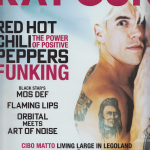
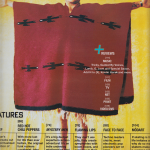
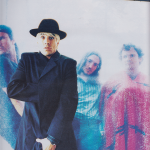
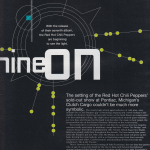
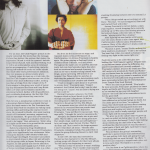
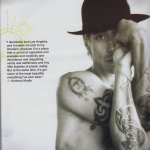
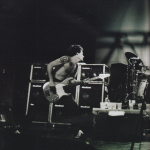
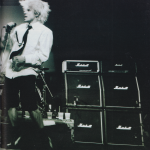

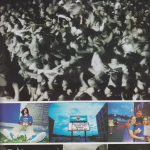
Thank you! 🙂
You’re welcome! Sorry there’s no transcript yet but I’m drowning under my ‘to do’ list so have decided to scan the pile of magazines that’s littering my desk right now as a start!
Not sure if your still running the site but thanks a ton im using this for my Music History class on The Red Hot Chili Peppers!
So happy it’s been of use! Yes, it is being updated, but things are failry quite with AK and the band right now (have you seen The Chili Source? It’s my other page and obviously the whole of RHCP).